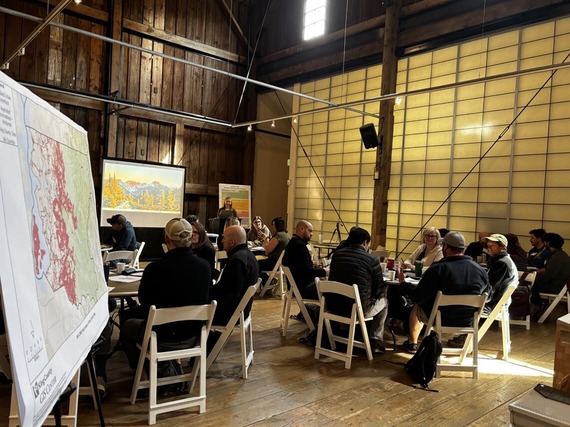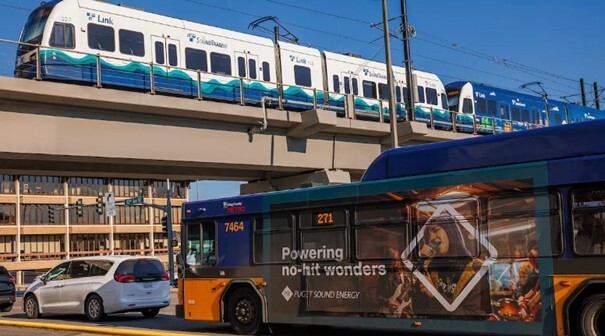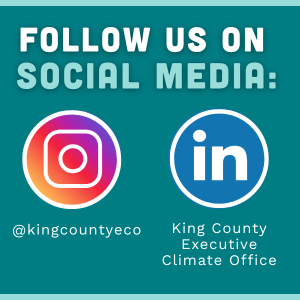|
This newsletter is written by the King County Executive Climate Office (ECO) in coordination with departments across the county. You can learn more about us at the bottom of this newsletter.
Weigh in on wildfire: planning for climate impacts & community protection
 May is National Wildfire Awareness Month, and there are several ways King County community members can learn about reducing wildfire risk and share their thoughts on regional preparedness:
- Check out the new Reducing Wildfire Risk landing page at kingcounty.gov/wildfire to learn about stewarding forests and natural lands, wildfire planning and response, and reducing health risks from wildfire smoke. You can also find information about King County’s Wildfire Risk Reduction Strategy.
- Share your thoughts on community resilience to wildfire by completing this survey. The King County Office of Emergency Management is developing its first Community Wildfire Protection Plan, and input through the survey will help shape that process.
- Learn about local evacuation procedures as part of the “Ready, Set, Go” campaign. This year, 12 Counties and the Suquamish tribe came together to raise awareness about messages that will be used in the case of a wildfire or other emergency event. Areas marked as “ready” should begin preparing for possible evacuation, packing a go-bag and emergency kit. Residents in “Set” areas are likely to be ordered to evacuate, and should make preparations to leave. “Go” means it is time to evacuate immediately from a given area. Learn more here.
As part of its planning efforts, King County convened several Community Wildfire Protection Plan workshops. King County Office of Emergency Management brought together representatives from fire departments, emergency planning offices, and other County and municipal agencies to learn about developments in wildfire mitigation research and to brainstorm ways to collaborate on evacuation planning, response and recovery; education and awareness; vulnerability and fuels reduction; and unmet needs and opportunities.
In 2022, King County released the first King County Wildfire Risk Reduction Strategy, outlining 12 actions to improve wildfire preparedness, response, and recovery countywide. The strategy’s approach and actions are intended to help address wildfire risk both as it exists today and with climate change — particularly in areas where wildfire is most likely to pose a significant threat to human life or property. The CWPP is one way that King County is working with partners to implement actions called for in the strategy. To read the King County Wildfire Risk Reduction Strategy, click here.
Governor signs Recycling Reform Act into law
 Governor Bob Ferguson has signed the Recycling Reform Act (SB 5284) into law, modernizing the state’s recycling system. The law will require manufacturers to reduce unnecessary packaging and take responsibility for waste, and will provide sustainable funding for recycling services throughout the state.
"This law is a win for King County residents, and for our climate action goals,” King County Executive Shannon Braddock said. “It will reduce waste, provide sustainable funding for residential recycling in King County, and make recycling services more equitable, ensuring all communities are empowered to take action.”
King County urged support of the legislation alongside fellow members of the King County-Cities Climate Collaboration (K4C). The group, made up of local governments and the Port of Seattle, works together to advance shared goals to reduce emissions — and urged that SB 5284 would make strides toward reducing waste and diverting material from landfills, which avoids significant greenhouse gas emissions. It will also create consistent recycling standards across the state to increase participation, improve equitable access to recycling services, and create new, green, local, living-wage jobs.
The law will help King County move toward waste reduction goals outlined in its Strategic Climate Action Plan and satisfies a priority action in the Solid Waste Division's Re+ Plan, along with its 2019 Solid Waste Management Comprehensive Plan.
Learn more about the changes this will mean for King County in this post from the Solid Waste Division.
U.S. Green Building Council announces King County among cities, counties selected in LEED for Cities Certification Cohort
 The U.S. Green Building Council (USGBC) just announced the cities and counties that will participate in this year’s LEED for Cities Certification Cohort – and King County is one of them! Participation reflects the County’s continued commitment to reducing emissions and providing a roadmap to a cleaner, more sustainable future - including advancing its goal of carbon neutral performance for all new capital construction projects by 2030.
The program, supported by USGBC’s partnership with Bank of America, will provide King County with technical assistance, peer-to-peer networking opportunities, and waived membership, registration, and certification fees to support work toward LEED certification. This builds on King County’s leadership in sustainable community performance, including early adoption of the STAR Community Rating System now integrated into LEED for Cities.
King County Energize program featured for impact on local families
 King County’s Energize program has installed around 130 low- to no-cost heat pumps, which provide cooling in the summer and heating in the winter, to eligible homes, childcares, and adult family homes. Resource Media featured the program in a video detailing the impact of local climate resilience programs – you can watch and share on Instagram or LinkedIn!
Energize promotes public health by ensuring people are experiencing safe, comfortable temperatures in all seasons, and reduces emissions by moving residents off of fossil fuel systems.
The program is supported with funding from Washington’s Climate Commitment Act. The CCA supports Washington’s climate action efforts by putting cap-and-invest dollars to work reducing climate pollution, creating jobs, and improving public health. Information about the CCA is available at www.climate.wa.gov.
More transit access! King County Metro buses will now connect to new 2 Line stations in Redmond
 Five Metro bus routes are shifting pathways to connect riders to and from Marymoor Village and Downtown Redmond stations, opening up connections to downtown Bellevue, Duvall, Issaquah, Kirkland, Sammamish, and later, downtown Seattle.
“We’re building a transit system where fast, reliable trains are part of everyday travel across our region,” said Executive Braddock. “By continuing to adapt our network of buses, we’re helping riders get from their homes and neighborhoods right to the light rail platforms.”
Learn more about the additions here.
How local lenders can support financing for clean energy & resilience projects
 King County’s Commercial Property Assessed Clean Energy and Resilience (C-PACER) program allows owners of eligible properties to seek long-term financing from a private capital provider for improvements related to energy and building resilience. King County does not provide funding for work on buildings, but rather administers the program and helps building owners navigate the process. It involves a loan agreement between a private lender and the property owner in which the County records the loan as a lien on the property, not the property owner’s balance sheet. This means that if the property owner sells the building, the assessment stays with the building, unless the payoff is part of the sale agreement.
Eligible property owners often reach out to us for help finding lenders to support their participation. To make this process easier and more transparent, we’ve launched a Request for Qualifications (RFQ) to build a publicly available roster of verified lenders. This will include banks, credit unions, Community Development Financial Institutions (CDFIs), and private capital providers. The list will be publicly available and serve as a go-to resource for property owners looking for financing options.
Please share this opportunity with local lenders and learn more about the program here.
Are you familiar with the King County Executive Climate Office (ECO)? Here’s a little more about who we are, and what we do:
Departments across King County implement climate action within their work. King County ECO elevates, coordinates and accelerates those efforts and manages several in-house programs. That includes work on building decarbonization, climate preparedness, climate equity and building a clean energy workforce. Our agenda is set based on the approaches laid out in the 2020 Strategic Climate Action Plan.
ECO works with the broader King County Climate Team, which includes climate leads from different departments.

Please share this newsletter with a friend, and we’ll be back in June with more news and updates. Until then, you can find us on Instagram and LinkedIn!
|